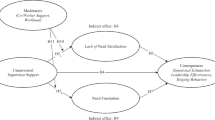Abstract
The Final Project is a student research course guided by a supervisor, involving activities from research proposal to reporting. Slow supervisor response times hinder project completion. This action research applies the social representation theory of shame to improve response times. A response time display feature is introduced in the ELISTA web application, visible to lecturers, colleagues, and leaders. The hypothesis is that this visibility will lead to shame, prompting lecturers to improve their responsiveness. Results show a significant increase in the percentage of lecturers responding within the six-day limit, rising from 9.37% in the pre-action to 36% in the third cycle. Supervisors feel embarrassed by extended response times in the “red zone.” The web application with response time display accelerates student final project completion effectively.
Access this chapter
Tax calculation will be finalised at checkout
Purchases are for personal use only
Similar content being viewed by others
References
Mhunpiew, N.: A supervisor’s roles for successful thesis and dissertation. US-China Educ. Rev. 3(2), 119–122 (2013)
Petre, M., Rugg, G.: The Unwritten Rules of PhD, p. 10. Open University Press (2004)
Leung, C.H., et al.: The development of a final year project management system for information technology programmes. Commun. Comput. Inf. Sci. 494, 86–97 (2015)
Simatupang, J., Muhammad, M.: Sistem Aplikasi Pengelolaan Tugas Akhir Berbasis Mobile. J. Res. Dev. 3(2), 66–75 (2019)
Fahurian, F., Zuhri, K.: Online thesis guidance management information system at Mitra Indonesia University. J. TAM Technol. Accept. Model. 11(2), 67–72 (2020)
Setiyani, L., Syamsudin, A., Gintings, A., Arifin, D.: The analysis of functional needs on undergraduate thesis information system management, Int. J. Adv. Data Inf. Syst. 1(2), (2020)
Bakar, M.A., Jailani, N., Shukur, Z., Mohd Yatim, N.F.: Final year supervision management system as a tool for monitoring computer science projects. Procedia Soc. Behav. Sci. 18, 273–281 (2011)
Antoro, S., Nur, F.: Time management skills : completion of student final project during the covid-19 pandemic. J. Humanit. Soc. Stud. 05(03), 232–236 (2021)
Hoxmeier, J., DiCesare, C.: System response time and user satisfaction : an experimental study of browser-based applications. Proc. Assoc. Inf. 2, 1–26 (2000)
Kim, Y.: An understanding of shame and guilt : psycho-socio-spiritual meaning. Torch Trinity J. 2(13), 218–232 (2010)
Gausel, N.: Facing in-group immorality: differentiating expressed shame from expressed guilt. Rev. Eur. Stud. 4(4), 1–7 (2012)
Marzal, J., Budiman, W., Adrefiza, Hutabarat, B.F., Kurniawan, W.: Improving the response time of online letter management application users: an application of social representation theory of shame, Int. J. Inf. Vis. 5(1), 39–45 (2021)
Nasution, T.H., Pratama, F., Tanjung, K., Siregar, I., Amalia, A.: Online thesis guidance management information system. J. Phys. Conf. Ser. 978(1), 012081 (2018)
Farr, R.M.: Common sense, science and social representations. Public Underst. Sci. 2(3), 189–204 (1993)
Mannarini, T., Veltri, G.A., Salvatore, S. (eds.): Media and Social Representations of Otherness: Psycho-Social-Cultural Implications. Springer International Publishing, Cham (2020). https://doi.org/10.1007/978-3-030-36099-3
Wagner, W., et al.: Theory and method of social representations. Asian J. Soc. Psychol. 2, 95–125 (1999)
Howarth, C.: A social representation is not a quiet thing: exploring the critical potential of social representations theory. Br. J. Soc. Psychol. 45(1), 65–86 (2006)
Giawa, E.C., Nurrachman, N.: Representasi Sosial Tentang Makna Malu Pada Generasi Muda Di Jakarta. J. Psikol. 17(1), 77 (2018)
Benedict, R.: Pattern Sof Culture. Mentor Books, New York (1959)
Fessler, D.M.T.: Shame in two cultures: implications for evolutionary approaches. J. Cogn. Cult. 4(2), 207–262 (2004)
Wells, M., Jones, R.: Childhood parentification and shame-proneness : a preliminary study. Am. J. Fam. Ther. 28(1), 19–27 (2000)
Wilson, M.: Creativity and shame reduction in sex addiction treatment. Sex. Addict. Compulsivity 7(4), 229–248 (2000)
Lo, M.G., Piermattéo, A., Rateau, P., Tavani, J.L.: Methods for studying the structure of social representations: a critical review and agenda for future research. J. Theory Soc. Behav. 47(3), 306–331 (2017)
Gülşen, T.T.: You tell me in emojis. Comput. Cogn. Approaches Narrat. 2016, 354–374 (2016)
Lavasani, M.G., Khandan, F.: Cypriot journal of educational, vol. 2, no. 1, pp. 61–74 (2021)
Dunlap, J.C., Bose D., Lowenthal, P.R., York, C.S., Atkinson, M., Murtagh, J.: What Sunshine is to Flowers, Elsevier Inc. (2016)
Lawson-Body, A., Willoughby, L., Lawson-Body, L., Tamandja E.M: Students’ acceptance of E-books: an application of UTAUT, J. Comput. Inf. Syst. 4417, 1–12 (2018)
Tyler, T.R.: Why People Obey the Law, no. December (2021)
Author information
Authors and Affiliations
Corresponding author
Editor information
Editors and Affiliations
Rights and permissions
Copyright information
© 2024 The Author(s), under exclusive license to Springer Nature Singapore Pte Ltd.
About this paper
Cite this paper
Marzal, J., Elisa, E., Utomo, P.E.P., Chit, S.C. (2024). Enhancing Supervisor Response Time: An Exploration of the Social Representation Theory of Shame in ELISTA. In: Zakaria, N.H., Mansor, N.S., Husni, H., Mohammed, F. (eds) Computing and Informatics. ICOCI 2023. Communications in Computer and Information Science, vol 2002. Springer, Singapore. https://doi.org/10.1007/978-981-99-9592-9_16
Download citation
DOI: https://doi.org/10.1007/978-981-99-9592-9_16
Published:
Publisher Name: Springer, Singapore
Print ISBN: 978-981-99-9591-2
Online ISBN: 978-981-99-9592-9
eBook Packages: Computer ScienceComputer Science (R0)




